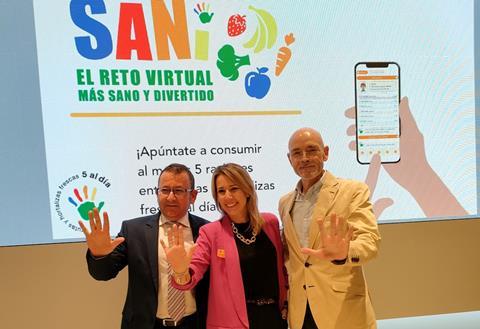SANI is the 5 A Day Association’s latest tool designed to promote healthy eating habits in schoolchildren
Spain’s 5 A Day Association has launched a new app to encourage schoolchildren to eat more fruit and vegetables.

SANI is an online game for fifth graders that aims to foster healthy eating habits
Each child can create an avatar and customise it by making different certain food choices in real life to increase their energy, vitality and strength.
“Children can choose from more than 100 fruits and vegetables, along with other foods such as meat, dairy, fish and cereals, as well as logging the physical activity that they do each day,” the association said.
“Variety and frequency are rewarded when choosing healthy foods and points are deducted if they eat too many ultra-processed foods or if they do not reach the recommended minimum number of foods per week.”
Prizes are also awarded for the top three healthiest classes.
The first phase of the project will involve 2,500 children from 78 schools in five autonomous communities. Schools taking part will receive a ‘Healthy School’ seal that they can display on their website and social networks.
Spain is one of the European Union countries with the highest levels of childhood obesity. A recent study shows 23.3 per cent of children are overweight and 17.3 per cent are obese.
Speaking at the launch event at the Ministry of Agriculture, Fisheries and Food, Purificación González Camacho, deputy director general for food promotion in Spain, commented: “In our country there is a great production of fruits and vegetables, accessibility to them, and a great diversity.
“For this reason, it’s easy to consume at least five servings a day and the 5 A Day Association makes it even easier for us through this new SANI app”.
Joaquín Rey Rodríguez, president of the 5 a Day Association, added: “With this type of project, the objective of promoting the consumption of fruit and vegetables is pursued, not only when we are sick or on a diet, but every day, which are fundamental in nutrition, providing energy, a natural source of fibre, vitamins and minerals and, in addition, they add colour and flavour to our dishes.
“The intention is that schoolchildren create healthy habits now and that they maintain them in the future when they are adults”.
Thirty per cent of children and adolescents do not eat fruit on a daily basis, and with vegetables the figure rises to 65 per cent according to the National Survey of Food Consumption in Child Population and Adolescents.
Manuel Moñino, president of the 5 A Day Association’s scientific committee, said: “We want the young population to have more knowledge about their diet. Rather than banning them from consuming anything we want to inform them about which foods are the most beneficial for health.
“This public health problem should concern all of society, not only because of the loss of quality and life expectancy of 2.6 years, but also because of the impact of disease on the economy, being responsible for about 10 per cent of health spending, reduced productivity, etc., which generates a cost of almost 3 per cent of GDP.”



